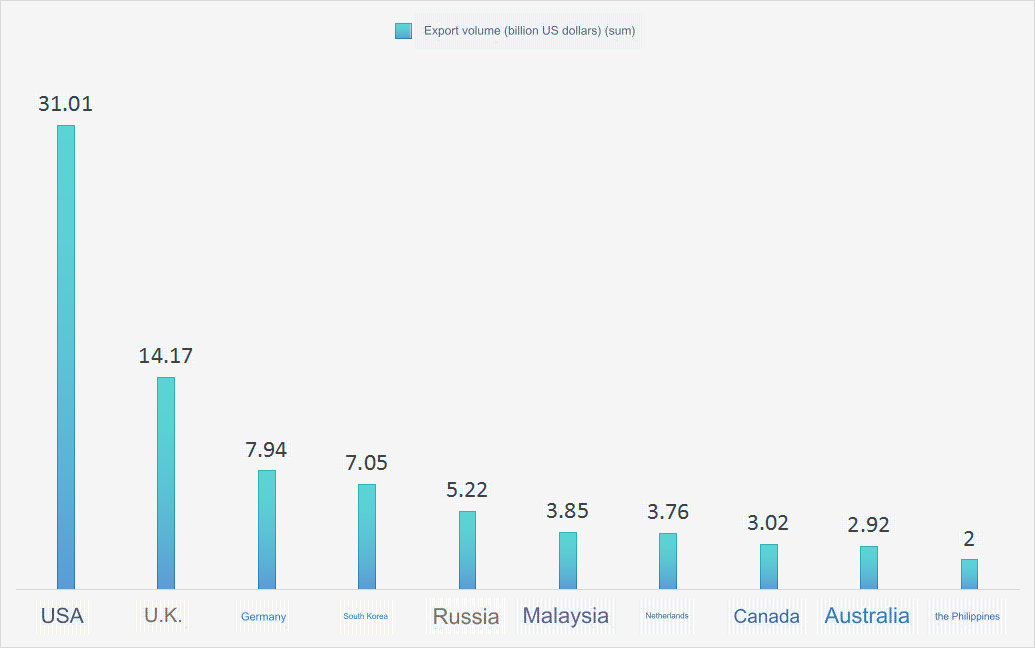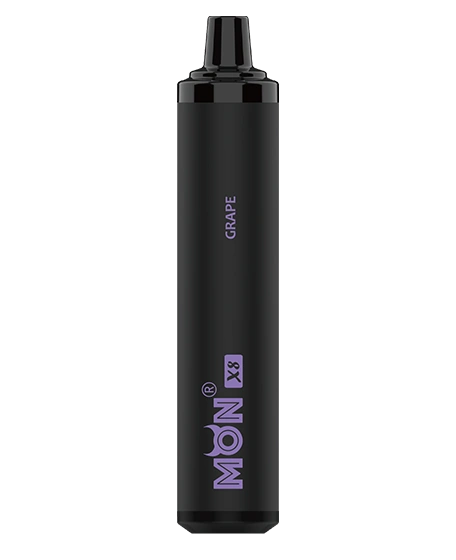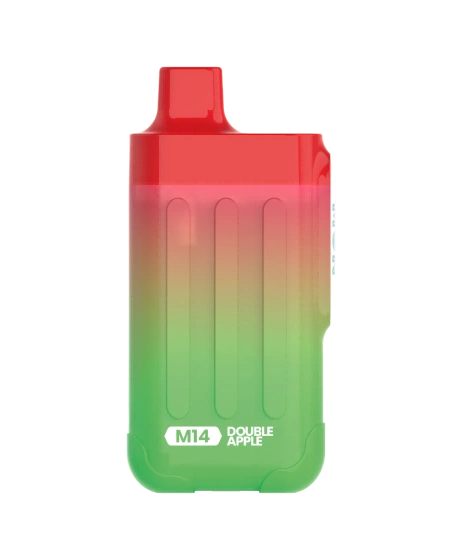Recently, the Chinese customs released the main market situation of China’s e-cigarette exports in 2023. CVIC has summarized it for everyone from four dimensions: export value, export proportion, year-on-year growth rate, and regulatory policies. The specific contents are as follows:
E-cigarette Exports Value

The United States remains the world’s largest e-cigarette market, with a volume more than twice that of the second-ranked United Kingdom. However, it’s worth noting that South Korea also performed well in 2023, surpassing Russia by over 100 million USD. Malaysia and the Philippines, located in Southeast Asia, also squeezed into the top ten in 2023.
E-cigarette Exports Proportion

The combined share of the three markets: the United States, the United Kingdom, and Germany, has exceeded half, highlighting the high concentration of core markets globally.
Year-on-Year Growth Rate
The Philippines, Australia, and the Netherlands are leading in terms of growth rate, indicating the huge potential behind the markets they represent. Conversely, the growth performance of mature markets such as the United States, Russia, and Canada is mediocre, and even a declining trend has appeared.
Regulatory Policies
Latest E-cigarette Related Policies in the United States
- Marketing Restrictions: Starting from January 1, 2024, New York State began implementing stricter marketing restrictions on e-cigarettes and vapor products. These restrictions include prohibiting the use of e-cigarette brand names, logos, or other identifiers on non-e-cigarette products. In addition, retailers are prohibited from providing gifts related to the purchase of e-cigarettes, and e-cigarette brands are not allowed to sponsor sports events and concerts.

- Product Design Restrictions: Texas passed a bill that will take effect on January 1, 2024, prohibiting the use of e-cigarettes packaged primarily in candy or juice packs aimed at minors. The legislation also prohibits the use of cartoon characters, symbols, or celebrity images aimed at promoting products to minors.
- E-cigarette Tax: As of March 31, 2023, 30 states, the District of Columbia, Puerto Rico, and the U.S. Virgin Islands have enacted legislation to tax e-cigarettes. The tax models vary from state to state, some are taxed per milliliter of liquid or consumable material, while others are taxed based on a percentage of specific costs.
Latest E-cigarette-Related Policies in Germany

Recently, Germany has introduced some new regulatory measures regarding e-cigarettes. These changes include new regulations on age restrictions for purchasing and using e-cigarettes, product packaging, and labeling requirements, nicotine concentration limits, and so on.
- Age Restrictions: According to the European Tobacco Products Directive (TPD), Germany prohibits individuals under the age of 18 from purchasing or using e-cigarettes and related products. This legal update aims to encourage responsible consumption and create a safe environment for young people.
- Product Packaging and Labeling Requirements: Germany has strengthened its guidance on e-cigarette product packaging and labeling. Manufacturers and retailers are now required to include health warnings on e-cigarette packaging containing nicotine to raise consumer awareness of potential health risks and enable them to make informed decisions.
- Nicotine Concentration Limits: A core theme of these regulatory changes is stricter control over nicotine concentration. The permissible levels of nicotine concentration in e-liquid have been standardized, in line with guidelines within the European Union.
- Advertising and Marketing Restrictions: In Germany, advertising and marketing of e-cigarette products are subject to specific regulations aimed at promoting responsible promotion while protecting consumers and public health. Unlike some EU countries that have implemented a comprehensive ban on specific advertising platforms, Germany has taken a more nuanced approach.
- Sales and Distribution Regulations: Online and offline sales of e-cigarette products are allowed in Germany but must comply with strict regulations. Online platforms must integrate age verification mechanisms to prevent sales to minors. Physical retailers should prioritize customer age verification when selling products in-store.
- Taxation and Pricing: With the increasing popularity of e-cigarette products, business sectors must be familiar with the tax framework applicable to their products and develop pricing strategies to ensure market competitiveness. The e-cigarette industry in Germany must deal with a detailed tax system that affects its profits. The main tax applicable to e-cigarette products is the value-added tax (VAT), with Germany’s standard VAT rate at 19%, applied to the final retail price of e-cigarette liquids, devices, and related accessories.
Latest E-cigarette Related Policies in the United Kingdom

In 2024, the UK is considering imposing new taxes on e-cigarette products to curb their use. This is part of a broader crackdown on addictive smoking alternatives like e-cigarettes. The proposed measures also include regulations on packaging, marketing, and flavors aimed at curbing the increasing use of e-cigarettes among children. However, the UK government has not considered completely banning the use of disposable e-cigarettes, but the Scottish government has indicated that it will consider implementing such a ban.
A spokesperson for the UK Department of Health and Social Care stated in a statement that they have implemented strict regulations to prevent children from using e-cigarettes, including restricting sales to those over 18, limiting nicotine content, bottle and tank sizes, as well as labeling requirements and advertising restrictions.
more information pls keep focus monvper


















